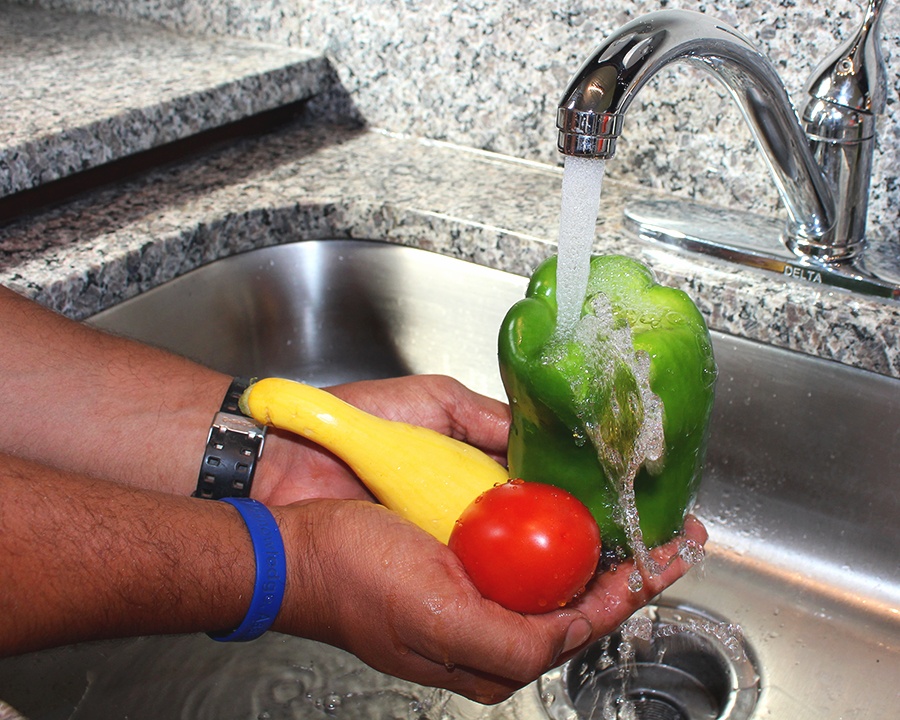
Ah, fresh vegetables. An endless smorgasbord of produce picked straight from the garden make the dead heat of July almost bearable as we chow down on homegrown wonders.
While you may be all too eager to sink your teeth into produce with that distinctive homegrown flavor, pause to consider food safety this summer. I know I’m guilty of thinking, “This is grown in my backyard. It can’t possibly harm me!”
It’s true, I do have a lot more control over what’s growing in my home garden, but there’s a reason there are so many policies from the USDA and FDA surrounding food. They want to keep us and our food supply safe and healthy.
To get into some of the most important details of food safety, I chatted with Dr. Judy Harrison. Judy is a professor and extension food safety specialist with the University of Georgia in the College of Family and Consumer Sciences.
She specializes in keeping produce safe – from home gardens to small farms and even mass production to protect public health. Judy was happy to share her best advice for keeping your produce safe for your family during summer harvest.
How to Plant a Safe Garden Using Compost
First, we talked a little bit about compost and why it needs to reach a safe internal temperature before you use it. (Right off the bat, I want to tell you that Soil3 always reaches a safe internal temperature.)
“So from a food safety standpoint, [compost] could contain disease causing organisms, especially if it contains animal waste. If you plant in the compost, you want to make sure you use a scientifically proven method to make it,” Harrison explained. “It needs to stay at the prescribed temperature for a long enough time to do away with bad microorganisms.”
If you’re making your own compost, Harrison recommended having your pile size be at least 5’x5’x5’. If the pile is too small, it won’t heat up quickly to kill bacteria. If you plan to sell your produce, do not use plate waste that has possibly come in contact with saliva. Use only kitchen scraps that have not been served such as peelings or overripe fruits or vegetables that you need to discard.
She also said that the temperature of your compost pile must reach a temperature of at least 131 degrees F for 15 days, and must be turned a minimum of five times.
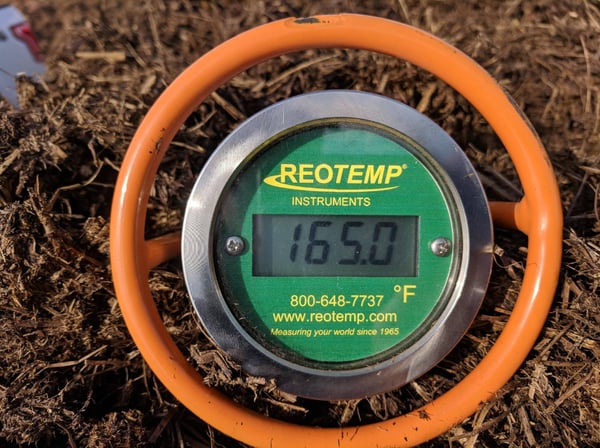 Our compost is heated to at least 160 degrees and turned for 3-4 months.
Our compost is heated to at least 160 degrees and turned for 3-4 months.
However, you should really get a compost thermometer at a garden center to determine if your compost has reached the optimum temperature to eliminate harmful microorganisms that could cause illness.
“If you do elect to make your own compost, you can’t just put it in a pile and never do anything with it. They need to make sure they get rid of harmful bacteria by turning it.”
These tips are especially important if you’re using any form of animal waste such as manure in your compost. Soil3 compost does contain manure from a local dairy, but luckily for you, our windrows of compost are turned over a period of 3-4 months and heated to at least 160 degrees before we even think about it letting it leaving the farm. And yes, we have a compost thermometer. It’s that big one in the picture above!
We ensure that our compost is heated for the food safety of your family, and it also gets hot enough to kill any weed seeds that may be lurking.
How to Avoid Home Garden Contamination
While a healthy compost is a great start to your home garden, there are also some key steps you should take to avoid any other contaminants in your veggie patch. These are known as Good Agricultural Practices.
“Look at where you’ll grow the produce, and make sure it’s an area where you don’t get runoff from a place with a lot of animals,” Judy said. “Runoff can carry feces and be a likely source for disease-causing microorganisms. You’ll also want to ensure your garden is in a spot where you can avoid flooding.”
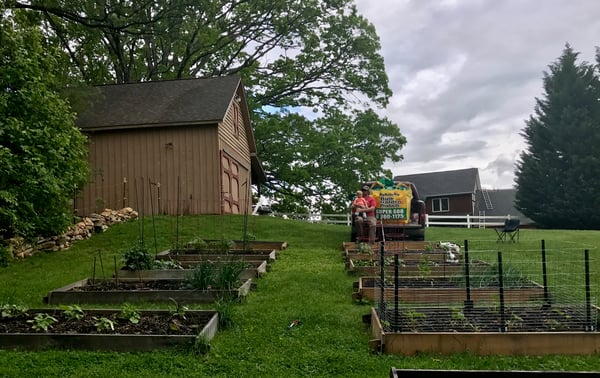 This family avoided the possibility of flooding by setting up their Doc's Raised Bed Garden Kits on a slight incline.
This family avoided the possibility of flooding by setting up their Doc's Raised Bed Garden Kits on a slight incline.
Though runoff and flooding may not be issues for you, it’s still important to ensure the water source you’re using for irrigation is safe. If you’re on city water, it’s likely treated and is safe for garden and household use (you can request city water reports from your local water office). If you’re on a private well system, even if you don’t have a garden, it’s recommended to get a yearly test for E. coli bacteria. A healthy well is important for all household uses. Cooperative Extension can help you with this.
To ensure even better food safety, Judy recommends keeping your pets out of garden areas if at all possible. They can leave behind bacteria and parasites.
Why It’s Important to Wash Homegrown Produce (even if it’s organic)
I’ve picked my share of blueberries from the bush and popped them directly into my mouth. However, just because it’s homegrown and has never met a chemical doesn’t mean you shouldn’t wash your produce.
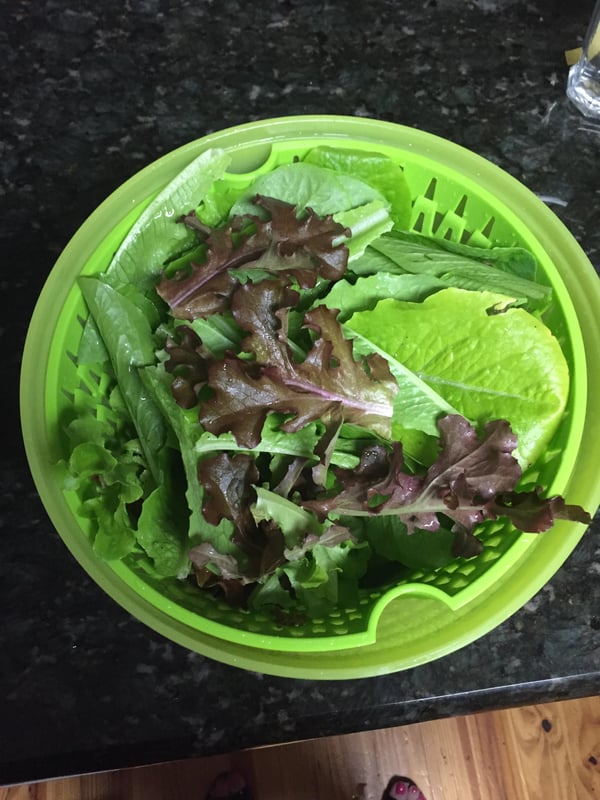 This Soil3-grown lettuce was rinsed under clean, running water before it became a salad.
This Soil3-grown lettuce was rinsed under clean, running water before it became a salad.
“The reason we urge people to wash produce no matter what is because harmful microorganisms are present naturally in environment. They can be in soil or in water,” Judy informed us.
There are also people who wander through the garden without clean hands and lots of folks who don’t practice garden safety.
Judy advises rinsing all of your produce under clean, running water to help wash off harmful organisms that are on the surface.
How Do I Prevent Contamination in the First Place?
Follow those same Good Agricultural Practices we spoke about above.
In addition to reducing the potential for environmental contaminants, you can take some precautions any time you work in the garden – whether planting, harvesting, or pulling weeds.
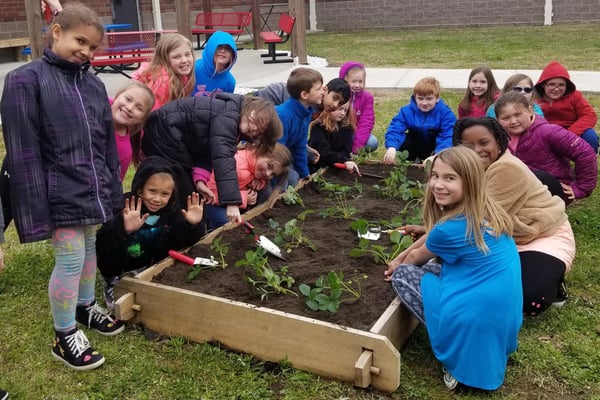 Clean hands and clean clothes were a priority for these kiddos planting in their raised bed garden.
Clean hands and clean clothes were a priority for these kiddos planting in their raised bed garden.
“Make sure you always handle the produce with clean hands and clean clothing. If you’re working with animals, don’t go directly to the garden. Change clothes first for food safety,” Harrison cautions.
You’ll also want to avoid cross-contamination during harvest.
“Use containers that you can wash and sanitize. Plain, unscented chlorine bleach and water make a good sanitizer to use on containers before you collect the vegetables.”
Kids and Garden Food Safety
Children are still learning garden safety and can take for granted healthy practices that are second nature for most adults. Here’s a poster from University of Georgia Cooperative Extension made specifically for kids in their school gardens.
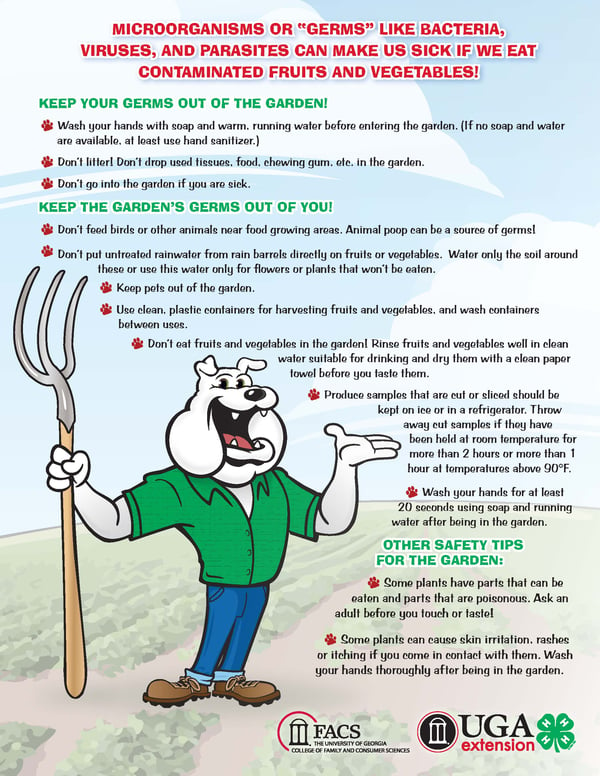
Some of our favorite points are as follows:
- Make sure you stay out of the garden when you’re sick and wait until you completely recover before going into the garden again.
- Wash your hands before and after you go to the garden! This will keep you and your plants healthier.
- Don’t put untreated rainwater on produce you’ll eat. Save that for flowers and shrubs that you won’t be consuming!
Thanks to Dr. Judy Harrison for her nuggets of food safety wisdom in this post.
Do you have any questions about garden food safety practices? Ask us in the comments section below!
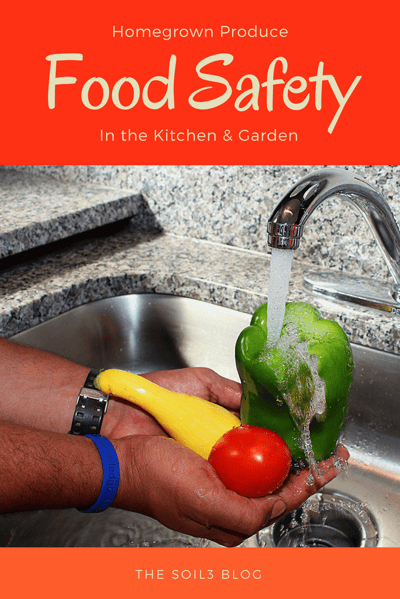
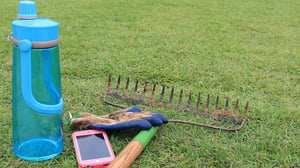
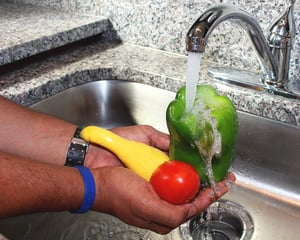

Did this help you out? Have any questions for clarity? Leave a comment below!